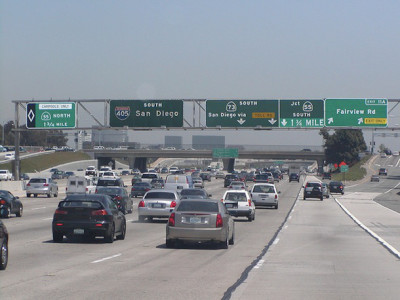Could California Supreme Court Review Of San Diego’s Transportation Plan Soon Be Moot?
Legislature may act this year to enshrine the 2050 greenhouse gas goals at issue in the case
As Rick blogged last week, the California Supreme Court on Wednesday granted review of San Diego's weak transportation plan. I detail the history here, but basically San Diego's regional transportation agency delivered a plan in 2011 that was supposed to comply with SB 375 (Steinberg, 2008), a landmark law linking transportation spending with long-term greenhouse gas emission reductions. Instead, San Diego's agency issued a plan that projected reductions in vehicle mi...
CONTINUE READINGThe Anticommunist Origins of Climate Denial
How Cold Warriors Wind Up Heating the Planet
The other night, my wife and I saw Merchants of Doubt, Robert Kenner’s new film about the climate denial industry. I thought it was excellent. I was surprised by the high production values and the way in which it did not feel like a documentary, at least until the last 15-20 minutes or so. (Then it began to remind me of a Frontline segment.) Former Republican Congressmember Bob Inglis of South Carolina, a die-hard conservative who lost his seat when he began to advoca...
CONTINUE READINGGuess Who’s Coming For Dinner?
We need research to feed a larger population without plowing the whole planet.
Who's coming for dinner? The answer, in case you're wondering, is "two billion more people." That's the population increase predicted for 2050. How are we going to feed those people? One method is to cut down a lot of the world's remaining forests and plow the world's remaining grasslands. That's a bad approach environmentally: it will release a lot of carbon and destroy a huge amount of biodiversity. If we don't go that direction, we need to be able to feed th...
CONTINUE READINGCalifornia Supreme Court to Decide Major CEQA, Climate Change Case
Justices' Latest Grant of Review Continues Supreme Court's Focus on Environmental Law
To paraphrase former President Ronald Reagan, there they go again. The California Supreme Court on Wednesday granted review in an important case at the intersection of the California Environmental Quality Act (CEQA) and one of the state's most important climate change laws. The case, Cleveland National Forest Foundation v. San Diego Association of Governments, is the latest in an unprecedented series of CEQA cases taken up by the Supreme Court. It's also the just...
CONTINUE READINGWhy Did Conservatives Support Saving Mono Lake?
The Skillful -- and Lucky -- Alliance Between Locals and Environmentalists
A little more than a year ago, I asked how the Mono Lake Campaign succeeded. I had previously suggested that a principal cause of the Mono Lake Committee’s success was the enemy: the arrogant, bullying, and reactionary Los Angeles Department of Water and Power. Everyone in the state “knew” that Los Angeles had “stolen” its water from the Owens Valley; it was relatively easy to assemble a political coalition against such an adversary. But using research of soc...
CONTINUE READINGTSCA Reform: That’s A Good Thing, Right?
Reform of the federal chemicals statute, the Toxic Substances Control Act (TSCA), is in the news again. It got me wondering, are we are better off with the devil we know? In a legislative era characterized by harsh partisanship and excruciating deadlocks, there are signs that TSCA reform could be a rare example of cooperation across the parties. Senators Vitter (R-Louisiana) and Senator Udall (D-New Mexico) appear poised to move the latest iteration through the Se...
CONTINUE READINGEcon101, Ideological Blinders, and the New Head of CBO
There are troubling indications that Keith Hall lets ideology blind him to basic economics.
Last week, in a post about the employment effect of regulations, I mentioned briefly that the new Director of the Congressional Budget Office, Keith Hall, had endorsed some questionable views on the subject. A reader pointed me toward an additional writing that has done a lot to escalate my concerns. There are disturbing signs about both Hall's ideological bias and even his grasp of basic economics. This writing was part of an exchange in the journal Risk ...
CONTINUE READINGRepublicans Hate Your Grandchildren, Part 2
Rick Scott Makes Sure Floridians Won't Know About Climate Danger
It's a common refrain around the web that Florida's Republican Governor Rick Scott looks a lot like Lex Luthor, the arch-villain of Superman comics. The term fits, both aesthetically and substantively: in his previous career as CEO of Columbia/HCA, he oversaw what was at the time the largest Medicare fraud in history. But as the Florida Center for Investigative Reporting, Scott isn't content to rest on his laurels: The state of Florida is the region most susceptible...
CONTINUE READINGOn China’s Remarkable Viral Air Pollution Video
Can 200 million viewers (and counting) be wrong?
Last Saturday evening, my research assistant (a wonderful JD student raised and educated in China) sent me a message: “This is a link to a documentary directed by Chai Jing (柴静). It has raised public concern about air pollution.” In perhaps the understatement of the year, she added: “Many Chinese people have been watching it.” The link was, of course, to Chai Jing’s remarkable documentary “Under the Dome,” which in less than a week has garnered...
CONTINUE READINGAccounting For Job Loss
The consequences of doing so may not be what you'd expect.
The Republican's choice for head of the CBO, Keith Hall, spent some time at a libertarian think tank reportedly funded by the Koch brothers, where he wrote about the effect of regulation on employment. Hall argued that regulations cause unemployment (include indirect effects because of price changes), and that the costs of unemployment should be included in regulatory cost-benefit analysis. In principle, it seems right to include the special harms associated with job...
CONTINUE READING








